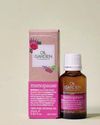
Nigella sativa is a powerful medicinal plant that is native to Bulgaria and Romania in Eastern Europe and Cyprus, Turkey, Iran and Iraq in Western Asia. The name refers to the Latin niger, meaning black from the seed colour, and it has been called by many names such as black cumin, black caraway, nigella, Roman coriander, black seed and fennel flower among others.
The plant itself is an annual flowering plant growing to 30cm, with finely divided leaves and blue or white delicate flowers. The earliest records of nigella cultivation date back three millennia, where the seeds have been found in various sites in ancient Egypt, including in Tutankhamun's tomb and a Hittite flask in ancient Turkey. The Persian physician Avicenna prescribed nigella seeds to treat digestive and respiratory symptoms in his ancient text The Canon of Medicine. Nigella seeds have been a major remedy in many ancient systems of medicine including Ayurveda, Persian, Unani, Chinese and Arabic medicines.
Active ingredients Thirty to 40 per cent of the seeds comprise an essential oil containing linoleic, oleic and palmitic acids and anethole, along with aromatics such as thymoquinone la major therapeutic ingredient), carvacrol, thujene, thymol and pinene. Proteins and alkaloids are also present in the seeds.
Therapeutic uses
Overall, the seeds are a potent medicine with anti-inflammatory, antioxidant, analgesic, antipyretic, antimicrobial, antiviral, antiparasitic, hypoglycaemic and antineoplastic properties. The seed oil decreases blood pressure and increases respiration.
Cardiovascular
This story is from the Issue 204 edition of WellBeing.
Start your 7-day Magzter GOLD free trial to access thousands of curated premium stories, and 9,000+ magazines and newspapers.
Already a subscriber ? Sign In
This story is from the Issue 204 edition of WellBeing.
Start your 7-day Magzter GOLD free trial to access thousands of curated premium stories, and 9,000+ magazines and newspapers.
Already a subscriber? Sign In

YOGA FOR IMPERFECTION
Life is messy and we all make mistakes, but by embracing imperfection, we can begin to accept all parts of ourselves.

Creating the foundations of ritualist self-care
As a busy mum of a three-year-old and expecting another baby, finding time for self-care often feels like a luxury.

Are you doom spending?
If \"doom spending\" has become your go-to for coping with stress, you could be making withdrawals from not just your bank account, but your health too.

THE POWER OF music
Most of us enjoy music. But science shows music is central to being human and its effect on us is far more astonishing and impactful than we realise. Music is fundamental to life.

SYNTHETIC FOODS
Synthetic, or genetically modified, fake meats and the like attempt to mimic real meat in both looks, taste and texture. But how much do we really know about the production process and how do they affect the environment and our bodies?

Embracing the power of nature
Menopause is more than just a biological change, it represents a significant life stage that can present numerous challenges - from hot flushes and mood swings to fatigue and sleepless nights.

Jan Fran
From a young age, Jan Fran's deep curiosity and keen interest in social issues sparked her journey into the world of journalism. As an accomplished journalist, media commentator and broadcaster, Fran's passion for storytelling has always been driven by a desire to explore, question and shed light on the world around her.

Helping teen girls thrive
Statistics reveal that many more teen girls are struggling with mental health issues. What's going on with them? More importantly, what can we do to help them flourish?

Your ageing eyes
Your eyes work hard for you every waking minute. It is no surprise that how your eyes age will be determined by how you protect them. Eating the right foods can go along way towards ensuring that your eyes stay healthy for a lifetime.

The bottom line
During the Couid pandemic, we were shocked to see people fighting in supermarkets over toilet paper and to see empty shelves that had once held roll after roll. The reasons behind the run for toilet paper during this time reflect the unique place that it holds in our psyche and are deeply rooted in our history.